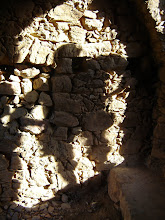Having been car-less for a while, I've recently been experiencing the joys of Dutch motoring again: those interminable waits at row upon row of traffic lights, those dodgy moments when some wannabe Michael Schumacher cuts you up in the early evening rush, and those occasions when roads are closed off at the drop of a hat for a pack of lycra-clad cyclists, leaving you to drive miles out of your way.
To take my mind off the stress on a trip to Sittard today, as is my wont, I started amusing myself with place-names. I’m sure I’m not the only one who was flabbergasted when DSM suddenly changed the name of their massive chemical plant in Geleen to ‘Chemelot’ a few years ago. Some bright sparks at DSM's communicatiebureau must have thought they’d hit on a real winner here. What’s more, their paymasters at DSM must have given their blessing to this misplaced brainwave. When I googled the word, I came across this PR blurb written by DSM:
In de nieuwe naam Chemelot klinkt niet toevallig de echo door van Camelot, de legendarische stad van koning Arthur. Zoals ooit de ridders van de Ronde Tafel uitzwierven, zo vinden nieuwe technologieën en producten vanuit Geleen hun weg over de wereld. Made in Chemelot, de chemiestad waar fantasie werkelijkheid wordt...
Not only is the analogy - comparing chemicals to the knights of the round table - plainly barmy, the first syllable doesn’t actually rhyme, but a lot of Dutch people wouldn’t get that either. But then I’ve never understood why they call a tram, a ‘trem’.
The name-change reminded me of a similar cosmetic makeover in the UK (shortly after the 1979 nuclear accident at Three Mile Island in America) when the name of the Windscale nuclear processing plant in the north of England became Sellafield overnight in1981. In the wake of bad publicity, British Nuclear Fuels decided to try and banish the bad memories by giving it a different name and, needless to say, it barely changed a thing.
A mile or so further on my journey this afternoon, I reached the turn off to Einighausen, a small village on the outskirts of Sittard, which has curiously kept its German spelling, unlike the names of the vast majority of settlements in Limburg that have been 'Dutchified'. The explanation seems to be that it once belonged to the Duchy of Jülich (but that was before Napoleonic times) and by some quirk of fate seems to have kept its German spelling.
To round things off, this evening I was at Rolduc Abbey in Kerkrade (NL). Rolduc is a shortened version of Rode-le-Duc, nothing more than a direct translation into French of the German, 'Herzogenrath', which more appropriately applies to the town immediately across the border in Germany rather than the abbey, which in popular parlance would have been called Kloosterrade (Dutch) or Klosterrath (German), in order to distinguish it from the neighbouring settlements of Herzogenrath (D) and Kerkrade (Kirchrath in German). I've never managed to find out why and when the French term was adopted in a location where French has never been spoken. Any suggestions?












